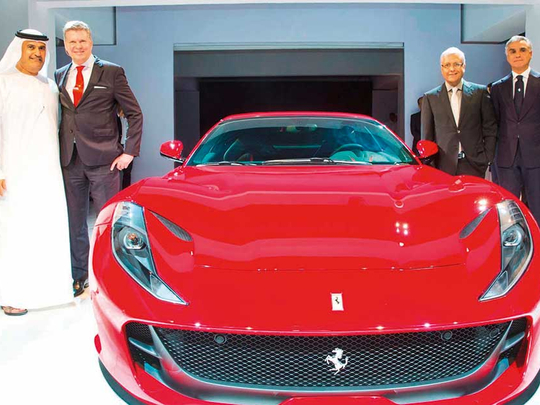
DUBAI: Ferrari does speed well ... and quite a lot of it at that. But with the 812 — the latest iteration of its V12 heritage — the Italian sports car maker has vaulted past quite a few speed barriers. Not much of a surprise there given that the 812 Superfast — that’s its full name — is billed as the most powerful production model to leave the Ferrari factory. (It would be given that the 6.5-litre V12 can raise 800-hp.) Clocking the 0-100 kmh in a mind numbing 2.9 seconds (and a maximum speed of 340 kmh), the 812 had its first viewing outside of the Geneva Motor Show — where it was unveiled last month — in Dubai.
And the first shipments will hit the UAE showrooms — running, of course — from September.
It will be priced from Dh1.26 million, and customisation can add quite a bit to the total. (For a Ferrari owner, the base price is just the first step in the bespoke process.) Al Tayer Motors and Premier represent the brand in the UAE. All off which could make for quite an interesting cruise for Ferrari in the latter half of the year, from a sales volume perspective.
“We have a long history with 12 cylinders in this part of the world,” said Dieter Knechtel, CEO for the Far East and Middle East operations. “The wow effect is there — people have seen the design and that the aerodynamics has been improved.
“This is the big-bang launch for this year. For this region, this is a very important model ... and has been long awaited. The interest in the 12-cylinder offering is strong.
“The 812 is the next logical step now that the F12 Berlinetta is coming to an end. It is a further development in a segment we have been leading.
“Dubai is the first market that we have presented the 812 live. The Gulf is a priority because of the heritage for the 12-cylinder. The momentum will be there for a long time.” (There is also a touch of poignancy with this particular model — it could be the last naturally-aspirated V12 to leave the Ferrari plant. Future versions would have the turbocharger, or hybrid support.) Even leading up to the 812’s arrival, Ferrari has been doing quite well — relatively — on the numbers side.
Last year, its sales grew by 1 per cent — and that’s nothing to be scoffed at when the rest of the market fell 30 per cent and the supercar category got hit with a 41 per cent decline. Such was the crisis situation that carmakers and their dealerships wouldn’t have minded even flat sales in comparison to 2015.
“The market had dropped off a lot ... but we had the strong offers and the cars,” Knechtel said. “And that means growth in Saudi Arabia and Kuwait as well. We have a (business) model that is proving successful even in difficult times, and we have a lot more stability than what others are facing.”
In the rest of the world, the silver horse has had a strutting time of it in 2016.
Just over 8,000 cars were shipped out overall and a 5 per cent improvement on 2015, and taking Ferrari closer to the 10,000 units a year milestone that Sergio Marchionne, the chairman, has in his sights. This year, the intention is to get in about 8,400 cars. (In financial numbers, net profit was 400 million euros (on revenues of 3.1 billion euros) against the 290 million euros pulled in during 2015.
This year, it forecasts revenues to be in the region of 3.3 billion euros. But even with higher production expectations, Ferrari will not shed its “make one less car than there is demand for” policy. It’s a touchstone the company has lived by all though its 70 years of extreme highs and a few turbulences.
“We have an obligation to be loyal to our business model,” Knechtel said. “When we see demand, we have the flexibility to increase production in the current set up. We can even go a little faster.”
Knechtel’s territories have contributed well to the 2016 tally, with gains in Japan, South Korea and Australia. (His remit does not include China, but there was growth there as well.) If it proves another difficult year for Middle East car sales, would Ferrari consider switching its shipments elsewhere? “There’s always the possibility to balance if we want to,” said Knechtel. “We don’t want to produce cars for which there are no customers and can adjust different markets if we have to.”












